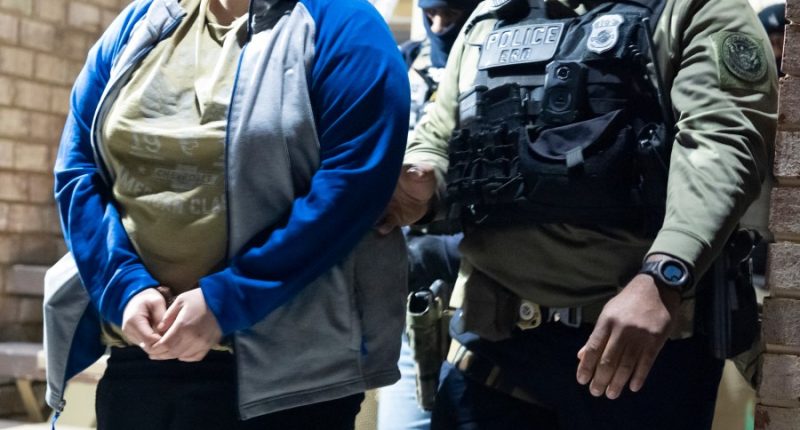Share this @internewscast.com

McALLEN, Texas (AP) — Despite cautioning nonprofit shelters along the U.S.-Mexico border about potentially breaching laws concerning human smuggling, the Trump administration has persisted in releasing individuals accused of illegal entry into their care. These organizations have long assisted by providing temporary housing and resources.
Border shelters, known for offering meals, overnight accommodations, and arranging transportation, were taken aback by a Federal Emergency Management Agency (FEMA) letter. This communication outlined “significant concerns” regarding potentially unlawful behavior and requested extensive details for a broad investigation. FEMA highlighted that shelters might have engaged in felonious activities related to the unauthorized crossing and internal movement of migrants.
“It was pretty scary. I’m not going to lie,” said Rebecca Solloa, executive director of Catholic Charities Diocese of Laredo.
Despite the March 11 letter’s implications, U.S. Immigration and Customs Enforcement continued asking Texas and Arizona shelters to accommodate individuals. This request placed shelters in a difficult position as it appeared to go against FEMA’s warnings. Both FEMA and ICE are under the Department of Homeland Security.
After receiving the letter, Catholic Charities received eight to 10 people a day from ICE until financial losses forced it to close its shelter in the Texas border city on April 25, Solloa said.
The Holding Institute Community, also in Laredo, has been taking about 20 families a week from ICE’s family detention centers in Dilley and Karnes City, Texas, Executive Director Michael Smith said. They come from Russia, Turkey, Iran, Iraq, Papua New Guinea and China.
Annunciation House in El Paso, Texas, has been receiving five to 10 people day from ICE, including from Honduras and Venezuela, said Ruben Garcia, its executive director.
International Rescue Committee didn’t get a letter but continues receiving people from ICE in Phoenix, according to a person briefed on the matter who spoke on condition of anonymity to discuss information that has not been made public. The releases include people who had been held at ICE’s Krome Detention Center in Miami, the site of severe overcrowding.
Working around conflicting issues
ICE’s requests struck Solloa as a “little bit of a contradiction,” but Catholic Charities agreed. She said some guests had been in ICE detention centers two to four weeks after getting arrested in the nation’s interior and ordered released by an immigration judge while their challenges to deportations wound through the courts. Others had been flown from San Diego after crossing the border illegally.
Those released were from India, China, Pakistan, Turkey, and Central and South America, Solloa said.
Smith, a Methodist pastor, said that the FEMA letter was alarming and that agreeing to continue caring for people released by ICE was “probably not a good idea.” Still, it was an easy choice.
“There’s some things that are just right to do,” he said.
Tricia McLaughlin, spokeswoman for the Homeland Security Department, drew a distinction with large-scale releases under Trump’s predecessor, Joe Biden. The Biden administration worked closely with shelters but, during its busiest times, released migrants at bus stops or other public locations.
“Under under the Biden administration, when ICE has aliens in its custody who are ordered released, ICE does not simply release them onto the streets of a community — ICE works to verify a sponsor for the illegal alien, typically family members or friends but occasionally a non-governmental-organization,” McLaughlin said.
The government has struggled to quickly deport people from some countries because of diplomatic, financial and logistic challenges. Those hurdles have prompted ICE to deport people to countries other than their own, including El Salvador, Costa Rica, Panama and — this week — South Sudan. If those options aren’t available, ICE may be forced to release people in the United States.
People can challenge deportations in immigration court, though their options are much more limited when stopped at the border. If a judge orders their release, ICE is generally left with no choice but to release them.
Families pose another challenge. ICE is generally prohibited from holding families with children under 18 for more than 20 days under a long-standing court agreement that the Trump administration said Thursday it would try to end.
The Trump administration has boasted that it virtually ended the practice of releasing people who cross the border illegally with notices to appear in immigration court. The Border Patrol released only seven people from February through April, down from 130,368 the same period a year earlier under President Joe Biden. But those figures do not include ICE, whose data is not publicly available
Close ties between shelters and federal authorities
FEMA awarded $641 million to dozens of state and local governments and organizations across the country in the 2024 fiscal year to help them deal with large numbers of migrants who crossed the border from Mexico.
FEMA has suspended payments during its review, which required shelters to provide “a detailed and descriptive list of specific services provided.” Executive officers must sign sworn statements that they have no knowledge or suspicions of anyone in their organizations violating the smuggling law.
The releases show how border shelters have often maintained close, if cordial, relations with federal immigration authorities at the ground level, even when senior officials publicly criticize them.
“We have a good working relationship with our federal partners. We always have,” Solloa said. “They asked us to help, then we will continue to help, but at some point we have to say, ‘Yikes I don’t have any more money for this. Our agency is hurting and I’m sorry, we can’t do this anymore.’”
Catholic Charities hosted at least 120,000 people at its Laredo shelter since opening in 2021 and housed 600 to 700 people on its busiest nights in 2023, Solloa said. It was counting on up to $7 million from FEMA. The shelter closed with loss of nearly $1 million, after not receiving any FEMA money.
Holding Institute, part of United Women in Faith, has cut paid staff and volunteers to seven from 45 amid the absence of federal funding, Smith said. To save money, it delivers most meals without protein. Language differences have been challenging.
The International Rescue Committee said in a statement that it intends to continue providing support services to released people in Phoenix.
“As the scale and scope of these needs evolve, the IRC remains committed to ensuring individuals have access to essential humanitarian services, including food, water, hygiene supplies and information,” it said.
___
Spagat reported from San Diego.

















